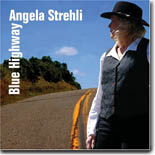 Veteran
lady vocalist and composer Angela Strehli has a recognizable,
seasoned blues voice. Blue Highway (M.C. Records) is her first
album in seven years, a presentation of well-sequenced, logical themes.
Good job on album graphics too, among her myriad photos is one of Texas
garb, another sitting on the back of a disabled California Buick Wildcat
hardtop, ca. 1970 model.
Veteran
lady vocalist and composer Angela Strehli has a recognizable,
seasoned blues voice. Blue Highway (M.C. Records) is her first
album in seven years, a presentation of well-sequenced, logical themes.
Good job on album graphics too, among her myriad photos is one of Texas
garb, another sitting on the back of a disabled California Buick Wildcat
hardtop, ca. 1970 model.
Rocking from the very start, we visit “Austin’s Home of the Blues.” She
calls many by name, most by now late greats, who have played regularly
at Antone’s. She wrote it for a documentary film. Her band is double-guitar’d,
and the guest list here is impressive: Maria Muldaur, Marcia Ball, Paul
Thorn, Tom Duarte and, from the archives, Stevie Ray Vaughan. In her
self-penned liner notes for each track, she is very humble, downplaying
her immense stature in Austin blues history.
Ball and Muldaur harmonize with the leader on the title cut; it has hit
potential. Ernie K-doe’s “Hello My Lover” has Tom Thorn’s guest vocal a
little forced, but the storyline and their chemistry is quite
enchanting. Shrehli sings in ballad form about what SRV meant to her,
then Memphis and gospel forms are tackled. Ann Peebles was an early
influence of the leader, but this is Angela’s first cover of that
material. Without trying to be Doris Akers, Inez Andrews or Shirley
Caesar, Strehli gets high marks for “Lord, Don’t Move The Mountain.”
Geographically we travel to Mexico, Tom Duarte’s “Spanish” guitar a nice
touch, as are the linguistics. The timeless topic of love must be
included, then the closing live Carnegie Hall 1985 track where Stevie
Ray and Double Trouble invited Strehli on-stage to deliver “C.O.D.”
(credited to L. Gooden, many have said it’s Albert King). Angela is full
of confidence, energy, and Texas. In fact her vocal power is seamless
between the newer recordings and this vintage tape, the audio holding up
well.
---Tom Coulson
Radio broadcaster/musician
comments to tcoulson@ktar.com
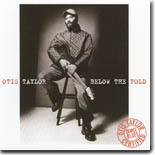 Otis
Taylor is menacing. Just glance at the cover photo of his 2005
release, Below The Fold (Telarc), his seventh release, and you
can tell he has a chip on his shoulder. This attitude works for his
music, which he calls “trance blues certified,” if not so much for his
vocals. He’s certainly forged his identity after experience with rockers
Tommy Bolin, Zephyr, and others, subtitling his work “minimalist blues.”
Today he uses much commentary as selection setup, storytelling live, and
in print on CD releases. In addition, photos of African-American
soldiers of the 10th Calvary from Taylor’s personal collection
well-decorate this new release and keep up with the continuous Otis
Taylor statement of artistic purpose.
Otis
Taylor is menacing. Just glance at the cover photo of his 2005
release, Below The Fold (Telarc), his seventh release, and you
can tell he has a chip on his shoulder. This attitude works for his
music, which he calls “trance blues certified,” if not so much for his
vocals. He’s certainly forged his identity after experience with rockers
Tommy Bolin, Zephyr, and others, subtitling his work “minimalist blues.”
Today he uses much commentary as selection setup, storytelling live, and
in print on CD releases. In addition, photos of African-American
soldiers of the 10th Calvary from Taylor’s personal collection
well-decorate this new release and keep up with the continuous Otis
Taylor statement of artistic purpose.
The music indeed is groove, or “trance” based, the audio is excellent
and backup musicians lend themselves well to the tapestry. A trumpet
occasionally is high in the mix. Percussion underlies maybe half the
tunes. It is Taylor’s approach to his line delivery I wonder about, very
repetitive, speaking instead of singing, and ad-lib-sounding. This
constant overplay feels like a crutch, as if he forgot the words or
can’t come up with anything else. The best of the selections are those
written with a simple, attractive, musical structure.
There’s no doubt about what’s on his mind. It’s best to follow the very
brief liners inside the jacket while listening to each track. On the
opening title, the danger of black people to demonstrate for civil
rights in the 1960s is notated. Then musically in a feel more like the
Civil War, fiddle, banjo and marching drum play behind the vocal “Tell
the white man ‘ain’t nobody gonna move.’” Mandolin is featured, as well
as electric guitar. Cello is played by Ben Solle on this disc.
Prostitution, death, old age, and sexual identity continue the tour.
Cassie Taylor sings engagingly on (Daddy) “Working for the Pullman.” She
plays bass on the rest of the disc. Heavy civil rights matter continues
on music of the 1914 Ludlow Massacre in Colorado, money meets evil,
Germans killing white and black soldiers, ending fittingly about the
triumph of true love in march tempo, harmonica added for buoyancy .
Otis Taylor hasn’t taken the easiest path to being a recognized
musician. His anger isn’t channeled as artistically as say a Charles
Mingus or Pete Seger. To see him live, his body language, attire and
overall conduct come across as against the grain. But he is becoming
successful. “I’m good at dark, but I’m not a particularly unhappy
person.” He tours among the bigger festivals and among his recordings,
“Double V” won Blues Album of the year in Down Beat Magazine critic’s
poll. His topics and opinions must be dealt with in society, much less
art. His canvass is rough and prickly.
---Tom Coulson
Radio broadcaster/musician
comments to tcoulson@ktar.com
She’s done it again. But why should that surprise? After 30 albums
on several labels, Maria Muldaur has always sung the blues
--- as a teenager in Greenwich Village, under the tutelage of
long-lived Victoria Spivey who was a star in the ‘20s, to a logical
progression thru the Even Dozen Jug Band, and of course Jim
Kweskin’s Jug band. All this preceded “Midnight At The Oasis,” the
remake of “Don’t You Feel My Leg,” and the good-sized hit “I’m A
Woman,” penned by veterans Leiber and Stoller.
Since affiliating with the Canadian Stony Plain label, Ms. Muldaur
has focused on a very definite reference point, a pre-war southern
country blues sound. This Sweet Lovin’ Ol’ Soul is a
follow-up to Grammy-nominated Richland Woman Blues which won
an Indie Award for Best Traditional Blues Album of the Year. Her
releases on this label now number four. I haven’t heard them all,
but Richland and this latest are all-acoustic. She penned her
own liner notes: “100 years later this soulful, innovative music is
as relevant and moving as when it was first created....It will
continue to be vital and relevant because with grace, wisdom, pathos
and a good dose of humor, the blues poetically testify to the common
feelings and concerns that have always been a part of the human
experience and are not likely to change or go away any time soon.
This is a bluesy old world, maybe now more than ever...” Amen,
sister!
Muldaur chose on this CD to expand on Memphis Minnie’s music. In
this regard she utilized two players, Ms. Del Rey and Steve James,
who specialize in recreating the Memphis Minnie/Kansas Joe
double-guitar sound (they are also vocalists in their own right). It
appears Minnie was associated with “I Am Sailin’,” “Long As I Can
See You Smile,” “Lookin’ The World Over,” and “Tricks Ain’t
Walkin’,” a street-walking depression saga. “She Put Me Outdoors” is
credited to Memphis Minnie and then confusing is the composer credit
also to Minnie for “I‘m Goin’ Back,” when Muldaur says in the notes
that it was a Bessie Smith/Clara Smith duet. At any rate the Bay
area’s Tracy Nelson, a very in-demand studio voice, joins Maria for
the recreation. There’s a big Bessie Smith number, “Empty Bed
Blues,” featuring the piano of Dave Mathews. Taj Mahal sounds
uncharacteristically forced on vocal during “Ain’t What You Used To
Have,” once done by Butterbeans and Suzy, a vaudeville duo known for
X-rated, double-entendre material from the pre-WWII era.
Early in the program sequence Maria revels in going back to her jug
band roots with the title track. On it she features, and dedicates
the album in part to, Fritz Richmond, “simply THE BEST jug player
EVER.” Listen closely, it’s rare to hear a well-recorded jug! For
“She Put Me Outdoors” the innovative Alvin “Youngblood” Hart is
guest. Normally retro and forward simultaneously, representing the
current generation of blues players, here he sounds very atypical.
Pinetop Perkins, in his early ‘90s, plays piano on “Decent Woman
Blues,” the only track sounding remotely urban. Concluding the
program is a gospel recorded by Blind Willie Johnson in ’29, “Take A
Stand,” where Taj Mahal returns on guitar, vocal and banjo.
Chemistry and joy are evident.
Muldaur’s voice is so seasoned you can practically see the theatrics
that she’s known for live, jump out of the speakers. Commendable are
guests of recognized names from the present-day area of Highway 61
and beyond. She also has a follow-up album of like-material already
in the can. Stay tuned.
---Tom Coulson
Radio broadcaster/musician
comments to tcoulson@ktar.com
 You’ve
got to love a woman who’s not afraid to say exactly what’s on her
mind. And while Candye Kane is definitely an acquired taste
as an artist, she is also one who is capable of producing
exceptional records. White Trash Girl, recorded for Ruf
Records, may very well be the defining record of her recording
career. It’s controversial, endearing….and most of all….great blues.
You’ve
got to love a woman who’s not afraid to say exactly what’s on her
mind. And while Candye Kane is definitely an acquired taste
as an artist, she is also one who is capable of producing
exceptional records. White Trash Girl, recorded for Ruf
Records, may very well be the defining record of her recording
career. It’s controversial, endearing….and most of all….great blues.
In going back to her early days in Austin, Texas as a recording
artist for Antone’s records, Candye enlists the aid of Kaz Kazanoff
and the Texas Horns, Gary Primich, Preston Hubbard, Riley Osbourn,
Stuart Sullivan, Jeff Ross and Damien Llanes to release her most
complete record to date. Ably produced by Kazanoff, White Trash
Girl
will grab your attention and hold it throughout. Opening with the
title cut, Candye proudly proclaims that she is indeed, a white
trash girl. But to her…being white trash is a badge of honor….not a
discriminatory distinction.
"Estrogen Bomb" warns us all to be afraid of all creatures female.
Hormones have a major effect on all of us and too much estrogen will
obviously have an impact on the female psyche. Candye’s rendition of
what to be afraid of in the presence of too much estrogen is a
wonderfully clever tune warning all of us males to be extremely
cautious around hormonal females. What Happened to the Girl is a
tune of longing for a lost friend and confidant. An original tune,
you feel Candye’s sense of loss for her friend and she follows it up
with the Sebastian John Benson tune, "What a Day for a Daydream."
"Big Fat Mamas are Back In Style" is a true Candye Kane anthem,
extolling the virtues of big women…they’re back in style again and
she’s proud to be one of the. "Queen of the Wrecking Ball" portrays
Candye as a heart breaker….one who rules the land of broken hearts,
dreams and promises….you want to take cover in the presence of the
Queen of the Wrecking Ball!
"Misunderstood" is a classic ’50s style ballad that proclaims that
Candye is not misbehaving…she’s just misjudged and ultimately
misunderstood despite having the best of intentions. "I Wanna Do
More" continues the ’50s swing feel with the understanding that she
will do everything she can to please her man and make this
relationship work. "It Must Be Love" offers a diametrically opposed
look at relationship…..it seems the only time that things are
working is when the lights are out….the daylight hours are spent
arguing and driving each other crazy….It must be love!
The upbeat "Work What You Got" proudly proclaims that all any of us
can do is work with what we got…whatever our virtues are, Candye is
telling us that all we can do is put our best foot forward and work
it…work it proudly. Things slow down again with the original tune,
"I Could Fall for You," a heartfelt ballad that a wonderfully
sincere look at the way this woman feels about her current love.
"Mistress Carmen" speaks to the charms of the queen of the
neighborhood…a woman who has complete power over all of the men in
her life…one who Candye hopes to emulate and learn from. The next
song on the album, "Masturbation Blues," is pure Candye Kane at her
best. Not everyone can sing about self love like Candye does…and
pull it off. Some might think she’s controversial, but it’s just
Candye being Candye, and there’s no one else like her in the blues
world today.
White Trash Girl closes with "Let There Be Peace on Earth,"
sung in gospel fashion with a heartfelt wish for peace amongst all
of our brothers and sisters. An interesting close to an album
chock-full of surprises and treasures. Say what you will about
Candye Kane, White Trash Girl proves that she an extremely
capable artist who isn’t afraid to challenge our view of the
world…you’ve got to love her for that!
--- Kyle Deibler
Renee Austin has come a long way since her nomination for
Best New Artist debut at the 25th Blues Music Awards (formerly the
W.C. Handy awards). Her newest release on Blind Pig Records,
Right About Love, shows an artist who has grown both
artistically and vocally, a good sign that Renee is going to be with
us for quite awhile.
"Mouth of the Delta" has a revivalist feel to it and takes the
listener back to the roots of blues, the days of cotton farming and
indentured labor. It speaks of hope, salvation and a new day to
come. It’s a very powerful opening song for this record. Austin’s
vocal performance is blistering and sets the tone for the rest of
the record.
She moves on to the topic of love in "Harder Than It Has To Be," a
song about knowing that a relationship has run its course and it’s
time to leave. We both know it’s over, just let me go. "Right About
Love" then expresses the hope that this time, she’s gotten it right.
Having been alone for awhile, she’s wishful that this lover will
prove to her that he’s here to stay and the relationship will last.
"U-Haul" has a playful message for boys and their toys. Many of us
spend lifetimes compiling an enormous amount of possessions and you
just can’t take them with you. “Heaven ain’t Las Vegas…I can think
of some place worse…you can’t pull a U-Haul behind your hearse”
pretty much says it all. It’s an upbeat song with a Dixie Chicks,
Sin Wagon feel that is reflective of Austin’s Texas roots.
We’re back to the topic of love with "Thank You Card" and "Meant to
Be" "Thank You Card" expresses happiness that a former lover did her
a favor by leaving. He could have stayed and kept her miserable but
by leaving he opened the door for the love of her life, all’s well
that ends well and “I just had to send you a Thank You card!” "Meant
to Be" is a soulful admonishment that this current love is exactly
that, it’s meant to be. Regardless of circumstances, life issues,
pain, toil and trouble, this relationship is “Meant to Be.”
"Strangers on a Train" is a reflective song about two lovers who
never really knew each other, their relationship exists on a level
that fails to allow for the intimacy that she really craves. “Let me
introduce myself…after all these years I don’t believe we’ve ever
really met” laments the sadness of the relationship they’ve stayed
in for too long.
The next two songs, "Bugs" and "Chicken Coop," are just funky, fun
songs. "Bugs" is a Bobbie Gentry tune that reflects on all of the
annoying insects we come across and do nothing about. "Chicken Coop"
tells the story of a woman whose man has strayed to the local house
of ill repute. Her solution is to be in the line-up the next time he
visits and lay down the law of how their relationship is going to
continue. It’s a creative solution to a familiar problem and very
well done.
"That’s All Right" finds Austin singing a familiar Arthur Crudup
tune with a taste of ragtime in it. “The boy is bad but that’s all
right, poppa.” The last song on the album, "Mister Cowboy," oddly
feels out of place on the record. It has a Texas waltz flavor to it
that has me seeing Renee performing at the Austin, Texas roadhouse,
The Broken Spoke, as opposed to a blues club.
But make no mistake about it, Right About Love is a very good
record. Austin shares writing credits on nine of the 11 tracks and
vocally is the strongest I’ve ever heard her. Maturity in an artist
is something we all look for and Renee’s progression from the
independently released,
Dancin with Mr. Blue to her first Blind Pig Release, Sweet
Talk, to now is impressive. I look forward to hearing what her
next recording brings.
You done good, Renee!!
--- Kyle Deibler
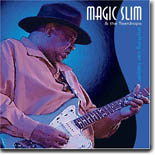 Anything
Can Happen is the latest
Magic Slim and the Tear Drops
release on Blind Pig Records. Conceived as a dual CD/DVD project, the
recording took place at the Sierra Nevada Brewery in Chico, California.
The Brewery is the site of a blues series on cable television and a
number of recent releases have been recorded there. That said, you have
the feeling as a listener that this is a record the Slim really wanted
to make.
Anything
Can Happen is the latest
Magic Slim and the Tear Drops
release on Blind Pig Records. Conceived as a dual CD/DVD project, the
recording took place at the Sierra Nevada Brewery in Chico, California.
The Brewery is the site of a blues series on cable television and a
number of recent releases have been recorded there. That said, you have
the feeling as a listener that this is a record the Slim really wanted
to make.
The show opens with "I’m a Bluesman," and Slim goes straight to work
picking notes and pushing the Tear Drops to their limits. He wants you
to know that “he’s got the blues deep down in his heart” and there’s no
mistaking it. Moving on, he makes sure you know that he may not be the
man you want, but he is…The Man You Need. On "The Man You Need," Slim is
just getting started picking the notes he wants you to hear. The
recording quality throughout is outstanding for a live recording and
everything comes through crystal clear.
"Goin to Mississippi" gets everything rolling in high gear. Magic Slim
is ably backed by Jon McDonald on guitars, Vernal Taylor on drums and
Chris Biedron on bass. Their collective years of playing together are
readily apparent on this record. The interaction between McDonald and
Slim is seamless, Taylor and Biedron provide a stable, thematic, rhythm
section, it’s just a very tight recording and a testament to their years
together.
"Black Tornado" is an instrumental that lets Magic Slim fire up his
Fender and just get after it. Moving on to "Please Don’t Dog Me," a song
about infidelity, Slim admonishes his better half to “Please Don’t Dog
Me when you know you’re doing wrong yourself." "Please Don’t Dog Me" is
one of the slower numbers on the record and simmers there, just waiting
to ignite. It features some of Slim’s best playing on the record.
"I Need Lovin" picks up the pace with the thought that Magic Slim needs
both love and money. He follows it up with "Mind Your Own Business," a
musical reminder that Slim is indeed, the reigning king of the 12 bar
blues. "Still a Fool," a song by Muddy Waters, finds Magic Slim back in
the swamps of the delta in true Morganfield fashion. I’ve not seen the
DVD, but you can almost feel the sweat dripping off of Magic Slim’s
brow.
"Shake It" is Slim’s reworking of the classic Elmore James tune, “Shake
Your Moneymaker,” and gets the crowd rolling. Slim’s energy is
contagious and you can feel Tear Drops moving into high gear on this
song.
"I Don’t Believe You Baby" and "Get
Your Business Straight" round out the album; the latter is the only
other non-Slim original on the record.
Anything Can Happen is a classic Magic Slim record. In the liner
notes Miles Jordan of the Chico News & Review notes that, “Slim
is quite likely the very last of the bred-in-the-1930s-Mississippi,
matured-in-1950s-Chicago bluesmen,” and he’s right. Magic Slim is one of
our last remaining delta to Chicago legends and thanks to Blind Pig
Records for ensuring that we have both an auditory and visual reminder
of one of our remaining blues treasures.
--- Kyle Deibler
There is nothing subtle about
Walter Trout. As a longtime Trout fan, I anxiously awaited the
opportunity to review Deep Trout, a retrospective look at
Walter’s early work released by Ruf Records. Kudos to Ruf for giving
this project first class treatment; the extensive liner notes provide
rare insight into the material pulled from Walter’s early albums,
Breakin’ the Rules, Prisoner of a Dream and
Transition. The albums in question span the time period from
1989-1997, and contribute to our appreciation of the evolution of
Walter.
Opening with "How Much Do You Want" is almost apropos…it’s a blistering
rocker detailing an all too common theme is music….where did the money
go? It’s a song about the fact that one of Walter’s managers ran off
with the majority of his tour receipts….leaving the band high and dry.
It segues into the melodic "To Begin Again," which is Walter’s answer to
all of his problems…the best thing to do is strap the Stratocaster back
on and get to it. "To Begin Again" is cathartic…a release of all the
pent up frustration that Walter had been dealing with and a call to arms
to go on. Great song and an astute choice to follow "How Much Do You
Want."
"Put It Right Back" is one of Walter’s hardest rocking numbers and was
recently covered by one of his mentors, John Mayall. The final cut from
Breakin’ the Rules, "Under My Skin" is a love song with a
mid-tempo gospel feel to it that is at once heartfelt and passionate.
"Victor the Cajun" is the first featured cut from Prisoner of a Dream
and features a blistering guitar solo back with a Zydeco backbeat. It’s
an interesting song punctuated at the end by Walter’s bass player, Jimmy
Trapp, having to get the last word in by saying, “pass the hot sauce.”
"Kill the Monkey," pulled from Transition, deals with an entirely
different subject matter, the environment. We’re so adept at polluting
the planet that the result is a universe run amok…we’ve got the
equivalent of a monkey on our back as the result of bad stewardship of
the planet and we need to “kill the monkey before the monkey kills us!”
Moving on to "Running in Place," Trout delivers a wonderfully melodic
ballad extolling the virtues of believing in love. The feeling you have
is real…you’ve just got to believe. "Running in Place" features a great
solo by Walter and is typical of his wizardry in writing ballads.
The placement of "Fast Moving Traffic"
as the next cut is curious. "Fast Moving Traffic" is all about the
pitfalls of drug addiction. It features great fretwork by Walter, a
thunderous supporting rhythm section with Trapp on bass and drummer
Bernie Pershey with great sound effects.
What follows is the acoustic love song "Earrings on the Table." Warmly
passionate and intensely reflective, "Earrings on the Table" is an
intensely personal account of a love who left. You can feel Walter’s
pain at having lost this true love.
"Motivation of Love" is the final cut from Transition and
features two insanely intense guitar solos by Trout. It’s a hard rocking
number that according to liner notes was one of the featured highlights
on Walter’s 1992 band tour. "If You Just Try" is the one song included
from the No More Fish Jokes – Live album. Recorded at a Danish
blues festival, "If You Just Try" is a slow burning blues cut that
showcases the passion of Trout’s guitar playing. Sonically, Trout is
capable of capturing your attention and having you hang on every note as
he does here by having his strat imitate a violin, showing indeed that
Walter is a master of his instrument.
The final cut, "Tribute to Muddy Waters" from Prisoner of a Dream,
features Walter and the band with their rendition of the lyrics that
ultimately became the basis for Jimi Hendrix’s "Voodoo Child." It’s a
live studio jam that just takes off and keeps firing on all cylinders.
Deep Trout includes three bonus cuts as well, an acoustic version
of "Life in the Jungle" from Breakin’ the Rules that features
Martin Gerschwitz on piano dueling with Walter. "Big Chain" is a song
that Walter played on for the bass player, Freebo, and "So Sad to Be
Lonely" is from Walter’s very early days with his band, Wilmont Mews,
back in New Jersey. "So Sad to Be Lonely" showcases Walter’s fretwork at
a very early age, back in the days when Wilmont Mews was competing with
Bruce Springsteen’s Steel Mill as the band to see in New Jersey.
Ruf did a wonderful job in compiling and supporting Deep Trout for the
retrospective look back that it is at Walter’s early days. New fans of
Trout’s will be ecstatic to read the liner notes and hear some of
Walter’s early history….old time fans will be glad to complete their
collection with a record that does their favorite blues guitar player
justice.
--- Kyle Deibler
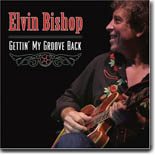 My
vote for the "let’s party, get down, raise some hell and go all night"
record has to go to Elvin Bishop’s latest release on Blind Pig
Records, Gettin’ My Groove Back. Ably backed by a wonderful band
including special guests,Norton Buffalo, Roy Rogers and Henry Butler,
this record proves that seven years was much too long to wait for a new
studio release by Elvin.
My
vote for the "let’s party, get down, raise some hell and go all night"
record has to go to Elvin Bishop’s latest release on Blind Pig
Records, Gettin’ My Groove Back. Ably backed by a wonderful band
including special guests,Norton Buffalo, Roy Rogers and Henry Butler,
this record proves that seven years was much too long to wait for a new
studio release by Elvin.
"What the Hell is Going On" gets the party started with a rocking
backbeat accompanied by what seems to be analog vocals. The echo in the
can effect has you scratching your head to start with but it gives the
song a unique feel and let’s you know that things are happening with
this record. "I’ll Be Glad" is an anthemic testament that the bad times
are over and Elvin is glad he has his groove back. Ian Lamson takes the
guitar lead on "I’ll Be Glad" and his inspired playing contributes to
Elvin’s upbeat take on the blues being gone. It's just a fun song that
will have your feet tappin in time to the beat.
The Don Gibson song, "Sweet Dreams," follows, and is the only
instrumental track on the album. Elvin takes the lead back on this song
and it features some of his most inspired playing on the record. "That’s
My Thing" features Elvin proudly stating that playing blues is his
thing. Norton Buffalo contributes some inspired harp playing; if this
song won’t wake you up….nothing will.
"Blues Train" is one ride we all need to be aboard. “It’s groove
transportation running all across the nation.” "Blues Train"
acknowledges that Elvin is getting older. While the boys in the band are
passing the whiskey around, Elvin is getting his groove on with “Diet
Pepsi…Caffeine Free!” My how times have changed. But at least Elvin
proves that he’s more than capable of holding his own.
What follows is Elvin’s ode to man’s
best friend, "He’s a Dog." Elvin’s best friend just happens to be named
Kirby. “He’s a dog but that’s all right with me. I’m not sure this song
needs the barking dog vocals in the background but its fun.
"Got to Be in New Orleans" is a testament to all things New Orleans.
Crawfish, Gumbo, Tipitina's, Tchopitoulas, the Neville Brothers, all
night partying --- these are the some of the things that New Orleans is
famous for and soon will be again.
"Come On Blues" is probably the darkest song on an album full of great
energy and good times. “Come on blues, help me make it through…Come on
Blues, I’m countin on you.” A little bit of distortion and some hard
chord playing make this song. Elvin has gone through some tough times in
the fairly recent past and "Come On Blues" seems to give him a chance to
exorcise some of that pain.
Elvin chooses to close Getting My
Groove Back with an appropriate song, "Party 'til the Cows Come
Home." I can’t help but feel that recording this record with all of his
friends enabled Elvin to do just that.
--- Kyle Deibler
Danny Rhodes has been traveling
around Northern Arizona for a few years now, spreading his brand of
blues with the Messengers much to the delight of those who have had the
privilege of seeing him live. And now he’s released a gem of an album,
Cairo to Cottonwood, that features him at his best…alone…plugged
in and acoustic.
"Long String of Blues" opens the record and is a shuffle lamenting a
string of bad luck that goes back quite awhile….”it’s been going on for
days.” One can’t help but hope his luck improves. "Born to Wander" is a
testament to Danny’s traveling ways. This Louisiana transplant has been
all over the country playing his brand of blues and this ballad is a
nice reflection of his birthright to travel.
Things pick up with "Riding That Rhythm," intricate picking highlighting
this tune while Danny discusses the virtues of a woman dancing to the
rhythm with moves like a cat while he pontificates “I have to admit I
like it like that.” Time is an observation of just how fleeting life and
love really is. “All we’re looking for is a little more time.” We all
have moments when we’re wishing for a little more time and Danny brings
that thought to reality in this ballad that is one of my favorite cuts
on the record.
"Romeo" is a tale of a slick ladies man who dresses well, waxes
philosophically and has all the moves the women like. Danny’s confidence
wavers a little bit when he states, “If I didn’t know better he could
even take away my girlfriend.” Romeo must be quite the player.
The fast pace continues on "Brother
Brother." “I just need someone to tell my troubles to,” lamenting that
his life on the road as a trucker is difficult enough with having to
deal with the fact that his girl is a player in her own right. “She
ain’t home when I call her….I know she went out to play.” Cut her loose,
Danny.
"Take Me Away," another great ballad by Danny, features some of the
strongest guitar playing on the record while lamenting the fact that he
has no reason to stay in the relationship he’s in. It segues into a
commentary on Arizona living --- "Alone in Arizona" finds Danny
wondering why he ever left Louisiana; things are definitely not going
well until he finds someone to love….”man, it aint’ so bad out here in
Arizona!”
"Lost in the Guitar" allows Danny to reflect on a failed relationship by
picking up his guitar and playing the pain away. “If you ever want to
find me, babe…you’ll know where I’ll be…lost in this guitar.” By far my
favorite cut on this record, it was co-written with Danny by Ricky
Rector and Bucky Lindsey. All of the other tracks on the CD were written
exclusively by Danny himself.
"Bad" promises that Danny will “get real bad if bad aint enough.” It
seems every woman needs a little bit of bad boy in her man…it’s just a
question of how much. "Baby Back" continues the theme with the knowledge
that “got my baby back again.” You’re never really sure why she left,
but Danny is very happy to have her back again.
The instrumental "Breakdown" gives Danny the opportunity to display his
finger picking virtuosity a little bit before closing the record with
the song "Little Child." This last number is a father’s lullaby to his
little one. It’s a song of love and affection for one who must be a very
spoiled youngster. “Sweet dreams…close your sleepy eyes!”
Cairo to Cottonwood is a great record by a local Arizona artist
who is building his audience one listener at a time. You can order the
record through Danny on his website,
www.dannyrhodes.com,
or through cdbaby.
It’s a record you’re sure to enjoy.
--- Kyle Deibler
 I
first listened to Johnny "Guitar" Watson's funk recordings
shortly after discovering his earlier groundbreaking West Coast blues
recordings. To me, Watson's
blues stuff from the '50s and '60s, recorded mostly for the Federal
and Modern labels, was among the hottest blues guitar I had ever heard.
Songs like "Hot Little Mama," "Three Hours Past Midnight," "Too Tired"
and, of course, "Gangster of Love" are blues recordings that have a
permanent place on my 'desert island' list.
I
first listened to Johnny "Guitar" Watson's funk recordings
shortly after discovering his earlier groundbreaking West Coast blues
recordings. To me, Watson's
blues stuff from the '50s and '60s, recorded mostly for the Federal
and Modern labels, was among the hottest blues guitar I had ever heard.
Songs like "Hot Little Mama," "Three Hours Past Midnight," "Too Tired"
and, of course, "Gangster of Love" are blues recordings that have a
permanent place on my 'desert island' list.
Well, you can imagine my
disappointment when I plopped a vinyl recording of Watson from the '70s
on my turntable. I wanted to hear more of that great, classic West Coast
blues. Being too musically naive to understand what I was hearing, I
took that LP down to the used record store and traded it in for
something bluesy.
Silly me. Watson had changed with the
times, but he was still Johnny Guitar, that gangster of love.
I had a different attitude and a much
more open mind when I recently received the two-CD set, The Funk
Anthology (Shout Factory), containing 31 cuts culled from eight of
Watson's funk albums. Now, to my ears, this is great stuff.
While he changed his style in that
musically turbulent decade, Watson didn't sell out and he didn't
compromise the quality of what he was putting down. He was every bit as
good of a guitarist and a songwriter as when he was doing straight West
Coast blues.
The re-recording of "Gangster of
Love," while somewhat different from his blues version, is just as good.
Among the other big radio hits are "A Real Mother For Ya," "Superman
Lover" and "Love Jones."
My favorite cut is the rowdy and
raucous "You Can Stay But The Noise Must Go," which is guaranteed to
liven up any party. There are six previously unreleased cuts on the
disc, including the super cool "ET," on which he compares his baby to an
alien.
Great music. I'm glad I've opened up
the mind in my more mature years.
--- Bill Mitchell
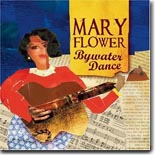 For
most people down here in Mississippi and Louisiana, the past few weeks
have been pretty tumultuous (especially on the Mississippi Gulf Coast,
where a 90-mile-by-one-mile stretch was basically wiped away by
Katrina), but most of the attention has been focused on the plight of
New Orleans. Watching the scenes of destruction on TV (once the trees
were cleared and power was restored) showed as sad a scene as could be
imagined and a lot of people wonder if the Crescent City would ever be
the same.
For
most people down here in Mississippi and Louisiana, the past few weeks
have been pretty tumultuous (especially on the Mississippi Gulf Coast,
where a 90-mile-by-one-mile stretch was basically wiped away by
Katrina), but most of the attention has been focused on the plight of
New Orleans. Watching the scenes of destruction on TV (once the trees
were cleared and power was restored) showed as sad a scene as could be
imagined and a lot of people wonder if the Crescent City would ever be
the same.
A couple of weeks after Katrina,
Yellow Dog Records released Bywater Dance by guitar virtuoso
Mary Flower. Long regarded as an accomplished fingerstyle guitarist
who also excels at lap slide, Flower recorded the disc in New Orleans,
in the Bywater area downriver from the French Quarter, in May of 2005
with a host of the city’s finest musicians providing assistance. It
serves as a positive reminder of how things were in New Orleans not that
long ago. The music is a mixture of old-timey New Orleans Jazz, swing,
and R&B, combined with Flower’s own folk-blues style, and sounds modern
and traditional at the same time.
The guest musicians include such
Crescent City stalwarts as pianist Henry Butler, keyboardist Jon Cleary,
clarinetist Dr. Michael White, and Kirk Joseph on sousaphone. Despite
all the guests, Bywater Dance is Mary Flower’s baby. Her guitar
work is breathtaking and her vocals are warm and inviting. Flower wrote
five of the 14 tracks here and all of them are of the instrumental
variety (“Raise The Devil,” “La Grippe,” “Terminal Rag,” with White
lending a helping hand, “Hudson River Rag,” and the pensive closer “Good
News Waltz”).
The remaining songs are an interesting
and sometimes unfamiliar set of covers, noteworthy among them a poignant
take on Geechie Wiley’s “Last Kind Word Blues,” a spirited version of
Leroy Carr’s “Papa’s On The Housetop,” and the Red Stick Ramblers’ “Main
Street Blues” is a definite high point. Flower’s cover of “Brother, Can
You Spare A Dime?” is particularly moving, in light of the current state
of affairs in New Orleans.
While Bywater Dance serves as a
reminder of the vibrancy and versatility of New Orleans’ musical
tradition, it also serves as a promise that this tradition will be
continued with the eventual rebuilding and restoration of the city.
Yellow Dog Records will be donating a portion of the profits from sales
of the album to charities working to support New Orleans musicians and
preserve and rebuild the city’s musical heritage.
--- Graham Clarke
Fans seeking a new taste of country
blues would be well advised to seek out Make A Change Sometime,
the potent release by Nathan James & Ben Hernandez. James,
guitarist for The James Harman Band, is a gifted musician who plays
electric, acoustic, and resonator guitar, and is a very good vocalist.
Hernandez also sings and plays harmonica, kazoo, spoons, jug, and
washtub bass. Each wrote three of the 16 songs featured here, and the
originals, like James’ “Keepin’ It To Herself,“ and Hernandez’ “Europe
Blues” and “Finished Last” blend seamlessly with the covers, which
include Sleepy John Estes’ title cut, Big Bill Broonzy’s “Lonesome,” and
Sonny Boy Williamson’s “Rub-A-Dub.”
Though most of the cuts feature only
James and Hernandez, there are a few others who drop by, like Harman,
who plays harp and sings on his composition, “Here’s Your Breakthrough,”
Nickel Creek fiddler Sara Watkins, who plays on several tracks, notably
James’ “The Well,“ and Gene Taylor of the Fabulous Thunderbirds, who
contributes piano on a couple of tracks.
The production, also by James and
Hernandez, is first-rate and the sound is crystal clear. Anyone who digs
the old bluesmen like Sonny Terry & Brownie McGhee, Hammie Nixon, and
Tampa Red will find a lot to enjoy here. For more information about
Nathan James & Ben Hernandez, go to their website,
www.nathandjames.com, or pick the disc up at
www.cdbaby.com.
--- Graham Clarke
Zac Harmon and the Mid South Blues
Revue won the 2004 Blues Foundation International Blues Challenge as
“Best Unsigned Blues Band.” Harmon is no fresh-faced newcomer though.
Born and raised in Jackson, MS, he honed his skills on vocals, organ,
and guitar on Farish Street, influenced by the likes of local legends
Sam Myers, Jesse Robinson, and Mel Brown. Harmon eventually served as
guitarist for Myers, Z. Z. Hill, Dorothy Moore, and McKinley Mitchell.
He even taught young Eddie Cotton to play church music. Relocating to
Los Angeles in the early ’80s, he shined as a writer/producer for such
acts as The Whispers, Karyn White, Freddie Jackson, The Mississippi Mass
Choir, Alexander O’Neal, Black Uhuru, and the O’Jays.
After awhile, however, Harmon returned
to the Blues, recording a live album in 2002. This follow-up, his first
studio album, serves notice that Harmon is a force to be reckoned with
on today’s Blues scene. The Blues According to Zacariah
(Bluestone Records) is a wild ride from the sacred to the secular.
Listen to the opening track, the rousing gospel tune “That Mighty High,”
and try to stay in your seat. The second tune, “Sugarman,” puts you in
the juke joint with a sensual vocal and solid guitar by Harmon. He also
covers Cotton’s “It’s Cool With Me” to great effect, as well as two
familiar standards (“Mannish Boy” and “It Hurts Me Too,” which features
Miss Mickey Champion on guest vocals).
The other originals include “That’s
Why” (with some impressive guitar work by Harmon), “Comfort of a Man,” a
solid soul number, and “Hole In My Heart,” a quintessential blues song.
With solid support by members of the
Mid South Blues Revue and excellent production, The Blues According
to Zacariah is an impressive effort from Harmon and leaves one
wanting to hear more.
--- Graham Clarke
In your mind’s eye, when you picture a
bluesman, more than likely Brian Blain is not the image that pops
up, but the Quebec native is one of the more unique blues artists you’ll
ever hear. His latest release, Overqualified for the Blues (NorthernBlues
Music), definitely backs that claim. Blain got his start playing rock
and classical music, but settled into folk blues and has worked on stage
and behind the scenes for many years as an artist, producer, manager,
and writer. He is an excellent guitarist and vocally he has a pleasant
style that suits his material well.
As for his material, most of Blain’s
12 compositions (the lone cover is a tasty version of Betty James’ “I’m
A Little Mixed Up”) are lighthearted looks at contemporary life,
including a couple of honest looks at the music world (“Blues Is
Hurting” and “One More Weasel,” a jab at music industry movers and
shakers), a look at Blain’s struggles in the computer age (“Hi-Tech
Blues”), and a song I’ve found myself humming as I plod through my day
job, “No More Meetings.”
The title cut is a tongue-in-cheek
piece that will leave you with a smile, and “Saab Story” is a clever
look at a girl and her car. As mentioned above, Blain is a great
guitarist (check out his fretwork on “Sailing”) and he has some stellar
support, including Harry Manx, who guests on slide guitar on “Peace,”
and Paul Reddick, who contributes harmonica on the title cut.
Overqualified For The Blues is
certainly one of the most original albums you’ll hear this year and is
definitely worth a spin.
--- Graham Clarke
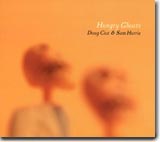 When
I heard the opening cut of Doug Cox & Sam Hurrie’s Hungry
Ghosts (NorthernBlues Music), a beautiful cover of Duane Allman’s
“Little Martha” (one of my all-time favorite instrumentals), I knew I
was going to enjoy this disc, and I was not disappointed. Cox is a
multi-instrumentalist and has played with artists such as Ken Hamm, Long
John Baldry, and Amos Garrett. Hurrie played with The Churls in the
’60s, opting to work and raise a family until he retired in 2001 and
returned to making music full time. Having met about seven years ago,
Cox & Hurrie have played together around Canada & eventually the U.S.
and Europe.
When
I heard the opening cut of Doug Cox & Sam Hurrie’s Hungry
Ghosts (NorthernBlues Music), a beautiful cover of Duane Allman’s
“Little Martha” (one of my all-time favorite instrumentals), I knew I
was going to enjoy this disc, and I was not disappointed. Cox is a
multi-instrumentalist and has played with artists such as Ken Hamm, Long
John Baldry, and Amos Garrett. Hurrie played with The Churls in the
’60s, opting to work and raise a family until he retired in 2001 and
returned to making music full time. Having met about seven years ago,
Cox & Hurrie have played together around Canada & eventually the U.S.
and Europe.
Hungry Ghosts consists of 13
tracks of original compositions and covers. The covers are the
aforementioned “Little Martha,” a tasty mix of Cox’s acoustic guitar
with Hurrie’s electric guitar sprinkled around, Son House’s “Grinning In
Your Face” (with guest vocals by Ruthie Foster and Cyd Cassone), Jagger
& Richard’s “No Expectations,” Tommy Johnson’s “Canned Heat Blues,” and
a couple of traditional tracks (“Kansas City” and “Valse Frontenac”).
The original compositions are very
good also, notably “Carry Me Away,” “Cool Drink of Water,” and the
closing instrumental “Red Haired Raga.” As noted above, both guitarists
are fantastic, whether on acoustic, electric, slide, or Dobro. Vocally,
both do a fine job, but the dazzling guitar work is what will bring you
back to this one for repeated listening. Fans of acoustic guitar will
want to pick up a copy of Hungry Ghosts.
--- Graham Clarke